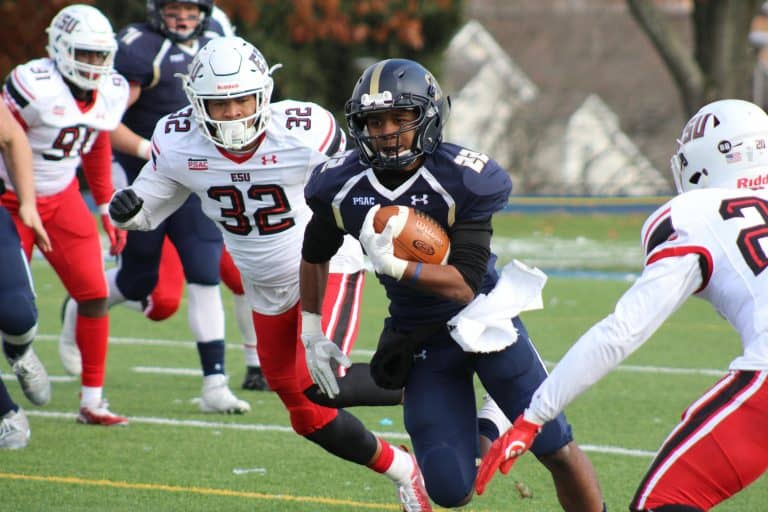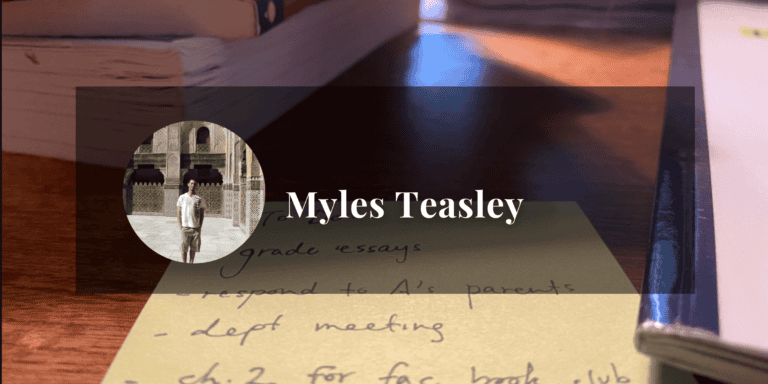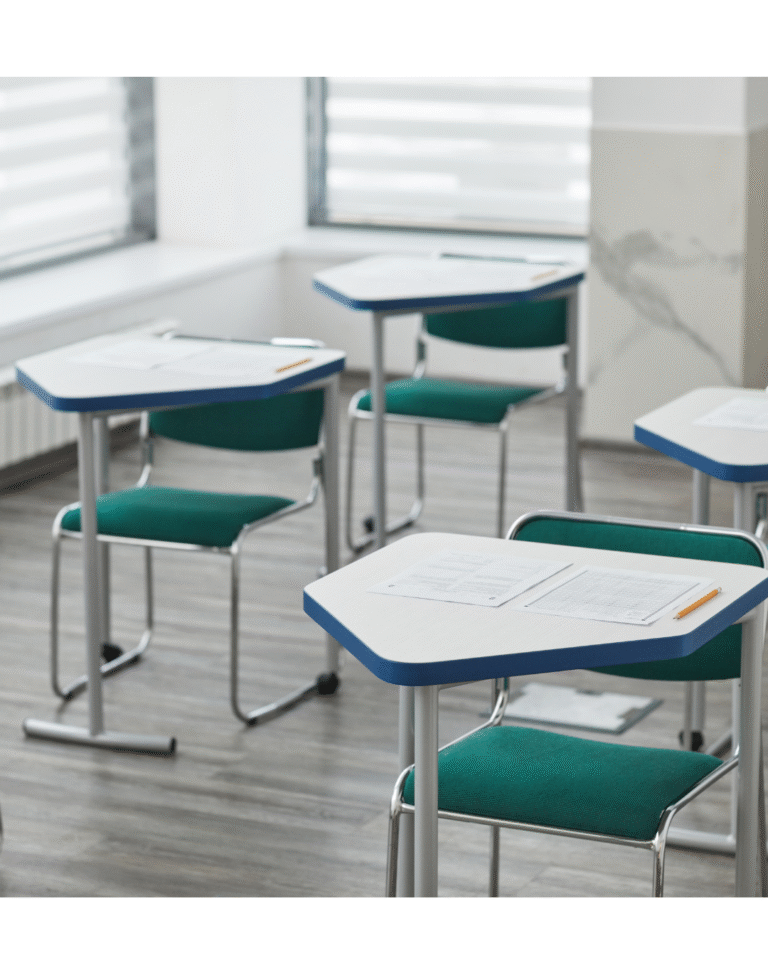REAL Teacher Feature: Helene Sughrue
Thank you to Helene Sughrue for sharing her REAL life with us! Helene is an English teacher at Tabor Academy in Marion, Massachusetts. Here are her thoughts on discussion, R.E.A.L.®, and learning.

Hometown: Marion, MA
Current City, School, Teaching Assignments:
Marion, Tabor Academy, English 2, English 2 Honors, Advanced Topics: Rhetoric and Composition.
Describe yourself as a student in three words:
Curious, anxious, intermittent. I think I was always trying to be focused, but I would get anxious and not focus. I think that a lot of the time I was running my eyes over the words rather than just ingesting them. When I think back on the class where I learned the most about the reward of learning, it’s Algebra 2. I ended the year with a 62. But, we used to get conduct and effort grades, and I got an A in effort. The teacher really recognized that I worked really hard for every one of those 62 points. I do think that’s the class where I learned the most about the process of learning. Even though I struggled and the grade wasn’t pretty, I’m still proud of the work I did in that class.
When it comes to class discussion, what is your “why”?
Always, my “why” is about independent thinking — about developing your own ideas, about becoming a more agile learner. I was so dismayed once when I had a student look at me and say, “can’t you just tell me what I think.” It’s so important to understand what you think and why you think it, especially in the messiness of the last several years.
In discussion, you practice every skill we practice in our writing: establishing a claim, providing evidence, and showing the reasoning for how you reached your conclusion. In discussion we do that all the time. I’ve never been a big fan of leading discussion myself, so R.E.A.L.® felt pretty natural other than the prescriptive parts. I have always had students write the discussion questions themselves and be in charge of discussion.
Take us back to the first R.E.A.L.® Discussion you led – what were you worried about going into it? What surprised you about it?
I worried that it would feel too prescriptive — and parts of it still do [especially for 10th graders]. The biggest success was the students’ reflection on the questions they devised, noting which generated robust discussion and which fell flat and why.
It felt very familiar and similar to what I was doing in the class, but it felt like a way to help students develop an internal system of regulating their talking. We did a practice discussion about dress codes, and the part that my students struggled with most was using their fingers to track their contributions. That was really hard for them. But I think because we did that, they became better at understanding how much they were talking and paying attention to that and inviting other people into the conversation who had been more quiet.
I use the portfolios as they are designed. One of the parts I really like is not grading the discussion – and I think the students love not having a graded discussion. I love just looking at the reflection and giving a grade based on the portfolios. I’m not known for generous grading, so it’s a way to reach a detente with my students. And I think it’s instructive to them: with three discussions, they can see what they are doing well and what they’re really not doing well.
How do you orient your students to R.E.A.L.®?
We practiced with a Tabor argument question — about dress expectations, I think. I would urge any teacher new to R.E.A.L.® to be patient. It can be messy, at first and always—but that messiness is just fine.
What advice would you give to a teacher on the cusp of starting their first discussion?
I would focus on why you’re doing it. It’s useful for students to understand that, just because a piece of something isn’t graded, it doesn’t mean that it isn’t part of something that is going to be graded. My advanced sophomores are very grade-conscious, so they would wonder: “Why am I doing all of this work while it’s not being graded?”
It was a relatively low-risk way to have them practice the skill they needed to focus on in their writing. For them to understand that it is part of a larger process that is getting graded, that the quality of these pieces matters a lot to the end product — that helped a lot. I think it’s frustrating for students when they don’t understand why they’re doing something.
How do you go about planning for a R.E.A.L.® discussion? What have you figured out about the types of texts, DQs, or structures that work well for your students?
We used our current text as the basis for discussion. Upon Kel’s suggestion, we use QFT to form questions. Love.
When it comes to discussion, what are your top 3 learning goals for your students?
1. Know what you think.
2. Understand why you think what you think.
3. Articulate both.
Can you think of a moment you’ve experienced this year or last where a student had a breakthrough during a discussion? What did it look like? How did that feel as a teacher? Did you see it have an impact on the other students?
A lone student ventured an opposing opinion; she did not back down, and neither did her peers—but they each understood the other’s perspective at the end, and they remained polite and respectful throughout.
This was a student who is relatively reserved who offered an opinion that was drastically different from what the other students in the class were saying. I was just fascinated watching her stick to it and watching her classmates really get at her reasoning. They really were asking her about how she landed where she landed. This was good-natured; it wasn’t combative or confrontational. Purely curiosity, and they showed a real desire to understand. It was just fascinating to watch them say, “Okay, I see how you got there. This is how I got to where I am.” It was great.
What is your go-to reward for grading a big pile of papers?
A calming British show. (My sons’ words, not mine.)
What discussion challenges have you encountered? How do you approach those?
Sometimes, students find timing themselves constraining; sometimes they find holding up fingers tiresome. I ask them to propose solutions — and then we discuss how those approaches worked (or did not). They wound up saying they would still time themselves, but they came up with asking whoever was timing to let them know when they get to two minutes, at that point they would make the decision if they thought they needed more time. So that’s what we do.
What inspires you? Do you have a favorite quote right now?
It’s January: Very little inspires me at the moment. Still, I find myself thinking about Queen Elizabeth’s sense of duty — however mixed my feelings are about the monarchy. (Oh, OK. My feelings are not mixed: I am ensorcelled. But I understand why the monarchy is inherently problematic.) I am simply trying to keep moving, my purse clutched in one arm, my expression steady and imperturbable. I will let you know how it works out once we get to March.
What’s next for you and your class? Where do you hope to take R.E.A.L.® in 2023?
With sophomores, we will soon be heading into Dystopian Spring—1984, V for Vendetta, maybe Brazil. With juniors, we will read The Awakening, memoirs of the students’ own choosing, and work on college essays. I hope that the English 2 students will continue to refine their questions for R.E.A.L.®; I hope that the English 2 Honors students will worry less about impressing and more about expressing in R.E.A.L.®






